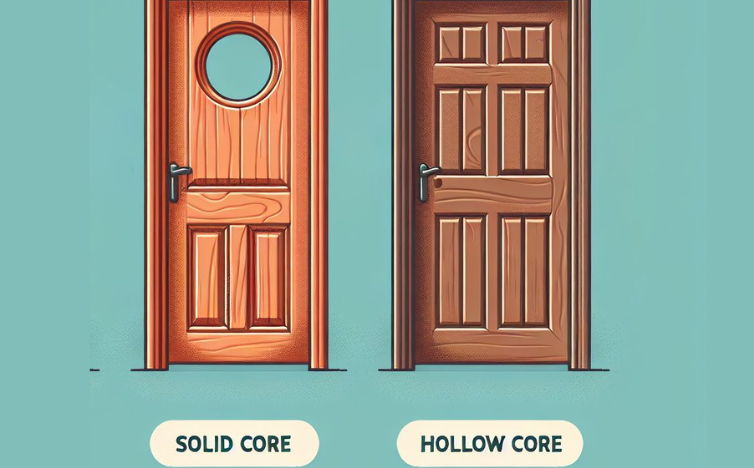Doors are a key element of any building, providing privacy, security, and aesthetics. Choosing between solid core and hollow core doors can greatly impact a space’s functionality, especially in terms of soundproofing, durability, and cost. This guide explores the differences, benefits, and ideal applications for both types of doors.
What Are Solid Core Doors?
Solid core doors are constructed with a solid interior, typically made of wood or composite materials. They are heavier and more robust than hollow core doors, offering superior insulation and noise reduction.
Key Features:
- Durability: Solid core doors are resistant to wear and damage, making them a long-lasting option.
- Soundproofing: Their dense structure helps block sound effectively, ideal for bedrooms, offices, or spaces requiring privacy.
- Weight: Heavier than hollow core doors, solid core doors feel sturdy and premium.
What Are Hollow Core Doors?
Hollow core doors are made with a wooden or fiberboard frame filled with a cardboard or honeycomb structure. They are lightweight and cost-effective, often used in interiors where soundproofing isn’t critical.
Key Features:
- Affordability: Hollow core doors are budget-friendly, making them a popular choice for homes and offices.
- Lightweight: Easy to install and handle due to their low weight.
- Limited Soundproofing: Their hollow structure provides minimal noise insulation.
Solid Core vs Hollow Core Doors: Key Differences

1. Soundproofing
- Solid Core: Excellent for reducing noise, making them ideal for bedrooms, home theaters, or meeting rooms.
- Hollow Core: Limited noise reduction, better suited for spaces where soundproofing isn’t a priority.
2. Durability
- Solid Core: More durable and resistant to damage, suitable for high-traffic areas or entryways.
- Hollow Core: Less durable, prone to dents and cracks, making them less suitable for demanding environments.
3. Cost
- Solid Core: More expensive due to their robust construction and better performance.
- Hollow Core: Cost-effective, perfect for projects with a tight budget.
4. Weight and Installation
- Solid Core: Heavier, requiring stronger hinges and more effort during installation.
- Hollow Core: Lightweight, easier to install and move around.
When to Choose Solid Core Doors
Solid core doors are a great choice for:
- Spaces requiring soundproofing, like bedrooms or offices.
- High-traffic areas, such as hallways or main entry points.
- Homes or offices looking for a premium, sturdy feel.
When to Choose Hollow Core Doors
Hollow core doors are suitable for:
- Interior spaces where noise insulation isn’t critical.
- Budget-friendly renovations or temporary setups.
- Rooms with less frequent use, such as storage spaces or closets.
Why Soundproofing Matters in Door Selection
Doors significantly affect the acoustic quality of a room. Solid core doors are particularly beneficial in reducing noise transmission, making them ideal for residential and commercial spaces where privacy and comfort are essential.
Call us: Contact DeSound Soundproofing Expert in Dubai For Soundproofing: +971 56 231 4204
Conclusion
The choice between solid core and hollow core doors depends on your needs, budget, and the specific application. If durability and soundproofing are priorities, solid core doors are worth the investment. For cost-conscious projects, hollow core doors provide a practical solution. Evaluate your space and requirements to make the best decision.

